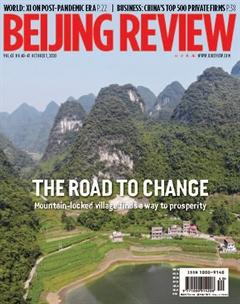Walking a Tightrope
By Shi Yongming
Yoshihide Suga, a long-time right-hand man of former Japanese Prime Minister Shinzo Abe, was elected to the top government post at an extraordinary parliamentary session on September 16. His campaign slogan was to carry on Abes unfi nished mission.
The political turmoil in the 1990s and at the turn of the 2010s led to a strong desire for stability in Japanese society. The long administration of Junichiro Koizumi(2001-06) and Abe (second, third and fourth terms, 2012-20) gave the people just that, even if they didnt help tackle the countrys deep-rooted problems. Thus Abes abrupt resignation in late August due to health concerns, though shocking, did not reversed the tendency. Against this backdrop, Suga will likely continue much of Abes policies.

Suga assumed the post of prime minister after succeeding Abe as president of the ruling Liberal Democratic Party (LDP). But his term as LDP leader will be limited to the remainder of Abes three-year term until September 2021. If he wants to remain in power for longer, he may have to call a snap general election later this year to improve his chances of winning a full threeyear party leadership term. It remains to be seen whether he is merely a transitional figure, or whether he will create his own era.
Down-to-earth style
Suga, 71, is from a family of strawberry farmers in rural Akita Prefecture. He moved to Tokyo after high school and then worked on a series of jobs to save enough money for university. Finally, he enrolled in Hosei University in Tokyo in 1969, majoring in law.
Suga entered politics in 1996 by first becoming a local representative, an important way for ordinary people to embark on political careers. His successful political career is partly due to his down-to-earth work style.
He was a cabinet minister during Abes first term as prime minister in 2006, accompanied Abe through his resignation a year later and encouraged him to make a comeback. When Abe returned as prime minister in 2012, Suga kept a low profile after being appointed chief cabinet secretary. He remained at the infl uential post throughout Abes stint as the longestserving prime minister in Japanese history. His political record suggests he could be the right man for Japan at this time.
Thorny issues
Politicians in Japan must now make a choice between maintaining stability or implementing reforms. Since the collapse of the bubble economy in the early 1990s, the nation has been struggling to find a way to restore economic development. Abenomics has had mixed success. It brought renewed profits to major companies, but small and mediumsized enterprises benefited little. Rising consumption taxes and stagnant income growth have widened the gap between the rich and the poor. For example, the number of heat strokes and resulting deaths in Tokyo rose sharply this summer, with a surprising number of people leaving their air conditioners off due to high electricity bills.
Abenomics actually has many paradoxes. For example, it encourages women to get jobs but in reality, the policy increases the burden on their families. This is probably an important reason for Japans low fertility rate, which, in turn, limits economic growth. The younger generation feels incapable of achieving career and personal goals, giving rise to a so-called low desire society.
Japanese politicians and society are already unable to deal with these economic and political challenges. Worse still, the rightwing elements, which remember fondly imperial times, have long rejected to appropriately refl ect on wartime history, making it difficult for constructive discussions about the development direction of the country and the world at large.
All this has pushed Japanese politics back to the traditional pattern of governance. Major factions within the LDP trade interests in order to maintain political stability and prevent chaos arising from the mounting populism or external confl icts.
A balancing act
Before the LDP leadership election on September 14, all the three candidates—Suga, former Foreign Minister Fumio Kishida and former Defense Minister Shigeru Ishiba—outlined their policy priorities if elected. Suga stressed the need to work on Abes unfinished policies, including normalizing ties with the Democratic Peoples Republic of Korea and signing a peace treaty with Russia to settle a territorial dispute and formally end hostilities dating back to World War II. Kishida, the LDPs policy chief, touted the importance of “soft power” diplomacy. Ishiba focused more on continuing to expand the right of collective self-defense.
These positions, similar to Abes, fail to address the root causes of Japans problems, as its real challenge is how to make the right choices in the new era.
For nearly two decades, Japan has wrestled with China on the issue of national strength. It views as unacceptable that the economic aggregate of China, with 1.4 billion people, has exceeded Japans, and believes this is what has resulted in the decline of Japans status in the international arena.

This misleading belief has led Japan to invoke the so-called “balance of power,”attempting to elevate its position by aligning itself with the U.S. and other Western countries. Abe, in his last hurrah, stressed the importance of keeping Japans position intact. But a diplomatic policy based on its alliance with the U.S. will inevitably push Japan into being a subordinate of the super power.
The real conflict between China and the U.S. today is whether to establish a new world order in which all countries cooperate on an equal footing or to continue the U.S.-dominated hegemonic system. Japan may have a different understanding of China-U.S. ties or the future direction of the world, making it hard for the nation to overcome its self-made structural dilemmas.
Suga has indicated that he would continue Abes policy to maintain stable China- Japan relations. But it remains to be seen how long this will last, and whether his pragmatic diplomacy can finally get Japan out of its own mess.


